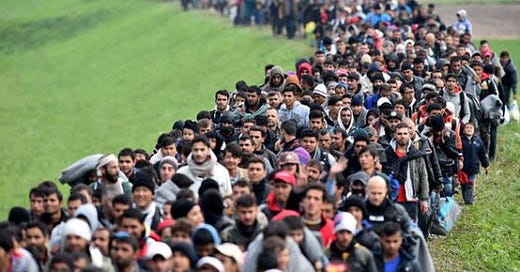Civic v Ethnic Nations
When it comes to undoing illegal mass migration, the political agendas of civic nations like the US, and of Central European nations are remarkably similar, in spite of persistent NGO lobbying
One of the major promises that helped Donald Trump win the American Presidency a second time was that of reversing unchecked illegal immigration to the United States, which currently surpasses 10 million people. Various measures against the flood of illegal immigrants to the US are currently under discussion, from drastic improvements to the security of the border with Mexico, to the return of illegal immigrants en masse to their countries of origin.
Unfortunately, there is little or no discussion about the prominent role played by Western NGOs in promoting, justifying or providing legal assistance to vast numbers of illegal migrants flocking not only to the United States, but also to the leading economic powers of the EU, such as Germany.
One such NGO is the European Council on Foreign Relations (ECFR) founded by Mark Leonard in 2007 with funds from George Soros’ Open Society Foundations and UniCredit of Italy. The ECFR’s Council has 50 founding members chaired initially by Martti Ahtisaari or Joschka Fischer. It is currently co-chaired by Carl Bildt and it reunites serving foreign ministers, former prime ministers, ministers, former EU members of parliament, former NATO Secretary generals, journalists, academics and business leaders.
Over the years, under the direction of Mark Leonard, the NGO has become a promoter as well as a strong supporter and apologist of unchecked illegal immigration into the European Union. Thus right after the million-plus wave of refugees was unwisely accepted by Angela Merkel into Germany, in April of 2016 Mark Leonard published a peculiar article, “The Migration Superpowers”, in which he argued that illegal, unchecked, mass immigration was already benefiting countries in three ways, announcing - no more and no less - that the world had entered a veritable “Age of Migration”.
Less than 2 months before the US presidential elections, on September 25th 2024, the ECFR published the article “Welcome to Barbieland: European sentiment in the year of war and elections”, in which Pawel Zerka claims that EU sentiment among European nations is still strong, although there are some who are disillusioned with the EU project: non-white and Muslim Europeans, the people of Central and Eastern Europe, as well as younger citizens in general.The paper claims that at the political level, too, the situation is stable, despite exceptions like Hungary, Slovakia, Netherlands, Italy and possibly Austria, which are rather Eurosceptic.
Zerka clearly regards the European Union as a vehicle for undermining its ethnic nations’ membership. One subtitle he uses, “Beyond white Europe”, says it all. The European Union, according to him, is supposed to press its members to ignore race and ethnicity altogether and to adopt the principles of universalism, equality and secularism as its foundational values. The author deplores the fact that Muslims feel physically threatened and marginalised, out of place and have little or no representation in the European Parliament. (The fact that, for the first time in decades, European Jews are under threat in Western European countries such as Holland and France, or that they feel more secure in Central European countries which did not accept Muslim immigrants, like Hungary and Czechia, seems totally irrelevant to him.)
When the author considers the causes of lukewarm support for the EU among Central and Eastern Europeans, he concludes that the nations in that region have an ethnic understanding of Europeanness. To prove this argument, he points out the resistance of the governments of Poland, Hungary, Slovakia and Czechia to implementing the compulsory relocation of illegal immigrants from other parts of the EU.
The main worry of the people in charge at the ECFR is that the European project is drifting towards an ethnic rather than a civic understanding of Europeanness. The above-mentioned author seems to believe, like Hans Kohn before him, that Central and Eastern European ethnic nationalism is somehow inferior to the civic nationalism characterising European countries such as the UK or France, or the United States.
Kohn’s views became the accepted orthodoxy in the inter-war era. According to him, France, the UK and the US are civic nations not based on tribal identity, but on common citizenship and the democratic understanding of politics. Thus, Pawel Zerka is in fact recycling Kohn’s old theory about the inferiority of Central and Eastern European nationalism and the supposed superiority of Western civic nationalism.
The promoters of such theories tend to forget that for a very long time the assimilation of minorities into the dominant ethnicity had also been the norm in Western nation states and was celebrated as progress.
It is unfortunate that in the study of nationalism, the geographic distinction between Western and civic on the one hand and non-Western and ethnic nationalism on the other, still persists to this day. In fact the differences between the two models of nationalism have been grossly exaggerated and are simply not real. Western nations were also based on a dominant national group that until very recently did not provide places for minorities in public life. We tend to forget today that in the 1930s an immigration country like the US had extremely restrictive immigration policies meant to retain “Anglo-Saxon” ethnic dominance, and that with very few exceptions, “over the last three centuries the building of all modern nation states required one ethnic group dominating and assimilating others”.
As a logical consequence, the propaganda undertaken by such NGOs should be deprived of funding in the future and politicians attracted to their membership should lose their status in their home societies.


